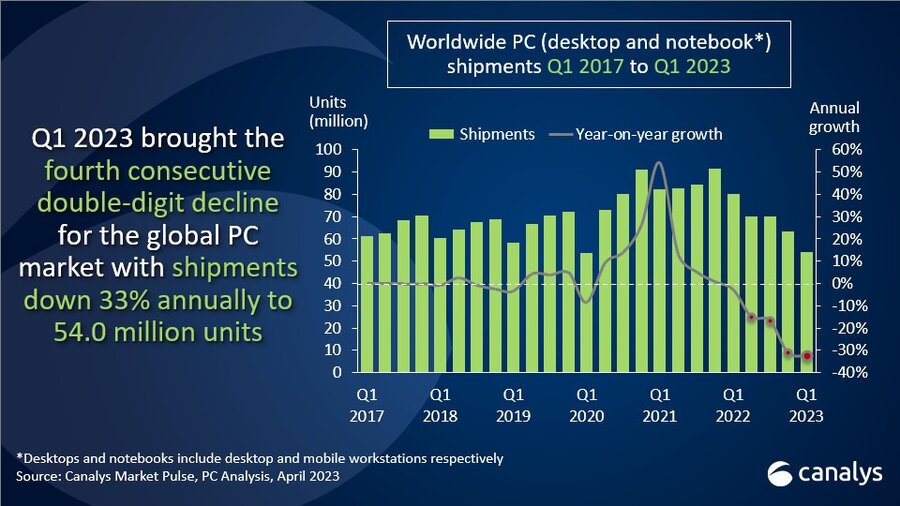Global PC shipments dropped by a third in Q1
After a nice spike during the first two years of the pandemic, global PC shipments continued to drop for a fourth consecutive quarter. Analyst firm IDC’s latest figure has Q1 down 29% from the same time last year. Canalys paints an even more troubling picture for the industry, with a full 33% drop.
A disappointing 2022 holiday set the stage for the beginning of the year, as vendor inventory has continued to pile up — a trend that is expected to carry at least into Q3. The plunge has been so consistent that last quarter’s figures dipped below those of Q1 2019, putting worldwide shipments below their pre-pandemic level.
“Though channel inventory has depleted in the last few months, it’s still well above the healthy four to six week range,” says IDC’s Jitesh Ubrani. “Even with heavy discounting, channels and PC makers can expect elevated inventory to persist into the middle of the year and potentially into the third quarter.”

Image Credits: Canalys
The culprits? For starters, a lot of people purchased new systems in 2020 and 2021 as their work settings adapted to a global pandemic. Laptops tend to have a life span of around three to five years. Desktops are even longer, at three to eight. People are likely to be content with their systems for a few years at least.
Assuming there’s a ceiling on PC sales, it’s simply not possible for the industry to maintain constant growth. You can, naturally, add ongoing economic troubles to the list. When things look bad, people tend to hold off on purchasing big-ticket items. Laptops (a category that excludes tablets) were the worst hit, marking a 34% Y-o-Y drop, per Canalys. Desktops suffered too — but fared slightly better, with a 28% decline.
As vendors go, both IDC and Canalys have Apple suffering the largest drop, at 40.5 and 45.5%, respectively. That’s a staggering figure, likely owing — at least in part — to the company coming back down to earth, as the M1 chip managed to buck larger category trends in 2021/2022. That chip marked Apple’s biggest PC computing update since the company shifted to Intel decades prior. In spite of what ad copy might suggest, you don’t get a generational shift every year.
Image Credits: IDC
Apple nabs fourth place on both lists, with Lenovo, HP and Dell coming in at first, second and third, respectively, while Asus rounds out the top five. Each manufacturer suffered, however, with figures ranging from HP’s 24.1% drop to Asus’s 38.8% (per Canalys).
Both firms see reason for cautious optimism heading into the end of the year and early next. “By 2024, an aging installed base will start coming up for refresh,” says IDC’s Linn Huang. “If the economy is trending upwards by then, we expect significant market upside as consumers look to refresh, schools seek to replace worn down Chromebooks, and businesses move to Windows 11. If recession in key markets drags on into next year, recovery could be a slog.”


